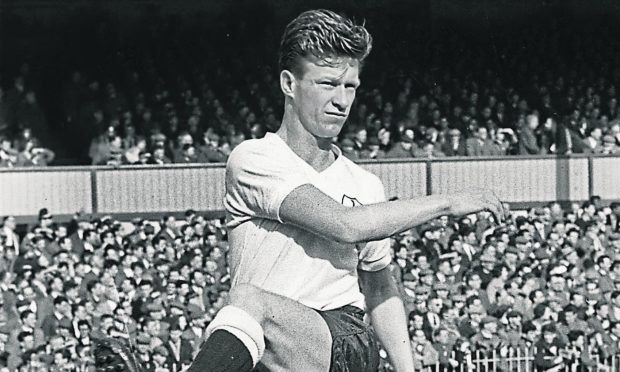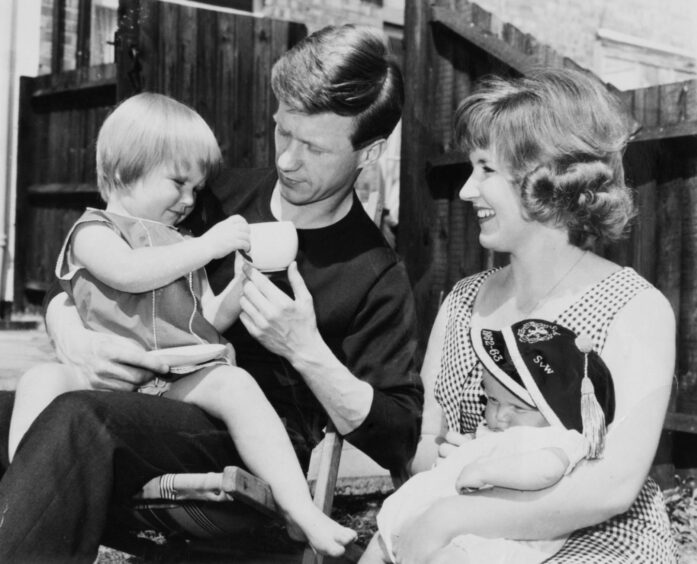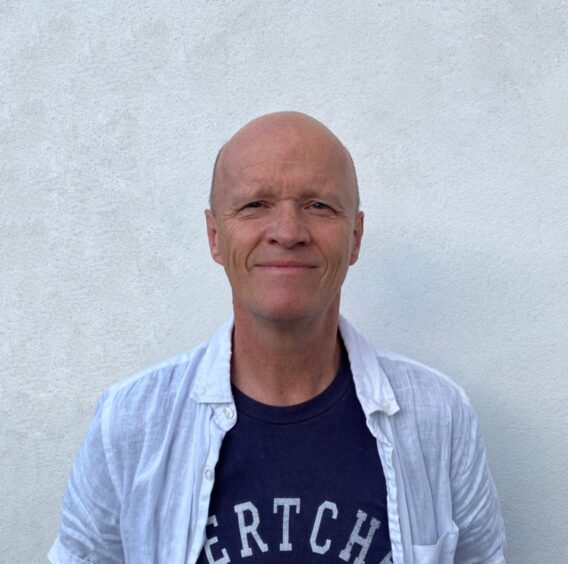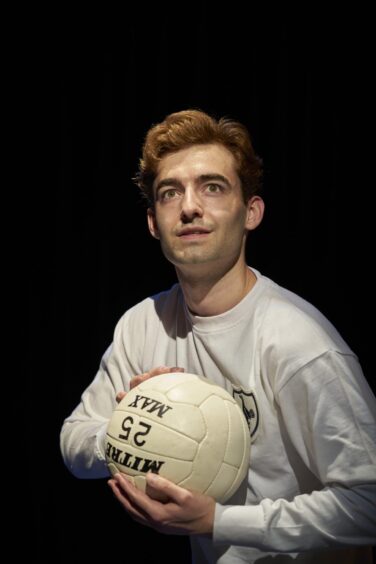
The picture is out of focus and shows only the top of his dad’s head, but the old photograph is special to Rob White.
It is the only one in existence of just him and his dad, taken shortly before a tragedy that stole a husband and father from his family, and robbed football of one of the greatest talents of his generation.
John White, the inside forward of Tottenham Hotspur’s trophy-laden team, died 60 years ago this month, struck by a bolt of lightning while playing golf. He was only 27.
Rob was just six months old when his dad died. He has spent a lifetime coming to terms with not knowing a man revered by so many, and puzzling over how to construct a meaningful relationship with someone gone for so many years.
‘There’s an incredible archive’
“It’s no wonder I became a photographer for a living, because all that stuff was so important to me when I was growing up – little glimpses of clues, the detective work I did,” explains Rob, speaking from his home in Tottenham. “I feel lucky there are so many pictures of him and so many people with memories of him.
“I’ve realised that once you open yourself up to people, they’re willing to share similar stories – be that stories about my dad, or about similar things that happened to them in their lives. I feel grateful that there are still people sending me pictures of my dad that I’ve never seen – that’s one of the amazing things about him being famous, there’s an incredible archive.”
Born in Musselburgh in 1937, John White started his senior career with Alloa Athletic and then moved to Falkirk. Spurs bought him in 1959, and he became a pivotal member of a team that won the league and cup double in 1961, the FA Cup in 1962, and the European Cup Winners’ Cup in 1963, becoming the first British club to lift a European trophy. He also earned 22 Scotland caps, scoring three international goals.
He was nicknamed The Ghost, due not only to his ability to drift into the opposition penalty box undetected, but for his pale complexion. “I know I’m biased, but I think it’s one of the greatest nicknames for a footballer to have,” Rob comments. “But as a kid, it caused me a lot of confusion. Was he called that after he died?”
Dealing with the shadow left behind by his dad caused Rob plenty of internal turmoil as he grew up.
“In my early years, there was a lot of confusion there,” he admits. “Sometimes I had a lack of confidence around other people who knew more about my dad than I did – what number of shirt he wore, how many appearances he made for Scotland, all these things I didn’t really process.
“When I became a teenager, like most people that age, I didn’t want to associate myself with my parents as I was trying to find my own identity. If your parent happens to be a famous footballer, or infamous footballer, it’s even worse.
“There was a point in my life where I did not ever want to be identified as the son of John White, because that was how I was quite often introduced to people when I was young. Now it’s come full circle: I’m 60 years old and I’m evangelical about the fact I’m John White’s son.”
It took Rob a long time to get to that point and part of the process was the writing of a book about his dad more than a decade ago. Calling it The Ghost Of White Hart Lane, the plan of writing a straight biography quickly shifted when he began chatting to his co-author.
“To Julie Welch’s credit, she became aware that the story of my relationship with my dad was the fundamental part of it. When the book was released, a guy called Alan Fisher, who is a Spurs fan, read the book and came to talk to me about it. He was on the board of the British Association for Adoption and Fostering, and he said he was recommending the book to people in his organisation, because it illustrates the gap that exists in people’s lives if they don’t have or don’t know a parent.
“There are points in people’s lives where having a dad is important, and there are points in life where not having a dad are important too, as are how you adapt to that and how your thoughts change.”
Rob, who has an older sister, Mandy, knew he wanted to mark the 60th anniversary of his dad’s death and commissioned a play to be written by playwright Martin Murphy. It receives its world premiere at Tottenham Hotspur Stadium on July 21, the day of John’s passing, and then comes to the Edinburgh Fringe, not far from where John grew up.
“I knew it would be a one-man play, because I’ve had a one-person dialogue with my dad through most of my life,” Rob explains. “It’s a clever tapestry that weaves my dad’s story of his beginnings in Fisher Row in Musselburgh and playing for Alloa, Falkirk, Tottenham and Scotland, with Martin’s interpretation of my feelings around growing up with that sense of longing and of not knowing.
“My dad’s sister died two years ago and that was the last of the family connection to Fisher Row, but I have family and friends in East Linton and Haddington. My sister has a flat in East Linton and I’ll be coming up during the Fringe.
“As a family, we spent our whole summer holidays at Granny White’s when I was a kid and Scotland still feels like home to me. I took my kids to the festival for years. This feels almost like a homecoming – it feels nice that he’s going back in some way on this journey. It’s important too that it is seen as a celebration – and I hesitate a little when I say that, because people might feel slightly strange about celebrating a death, but this is about celebrating a life.”
The golden days
John – who had two brothers, Eddie and John, who were also professional footballers – had been told by his manager Bill Nicholson that the next Spurs team would be built around him, such was his prowess and importance to the squad. That was never to be, but Rob is keen to make sure his dad’s achievements – which include posthumous inductions to the Tottenham and Scotland Hall of Fames – are not forgotten.
“A lot of people think the history of football starts with Sky Sports, so part of the play illustrates the difficulties of being a footballer then – of doing national service, of travelling from Musselburgh to Alloa, just the logistics of things like that,” Rob says.
“I guess it’s partly remembering the golden days but also of keeping those memories alive. As you can tell, I’m massively proud of what my dad achieved, and I think there is a danger these things aren’t remembered or celebrated.”
Rob hopes the play does well in Edinburgh and can grow and be seen by even more people.
“When the great reviews come in, we think it will come back to London for a run, and the golden ticket would be someone seeing it and thinking it could be adapted for a longer West End run,” he adds.
“The long-term goal is to get it to a place where it is seen by as many people as possible.”
The Ghost Of White Hart Lane, Underbelly Bristo Square (The Dairy Room) July 31-August 25

Enjoy the convenience of having The Sunday Post delivered as a digital ePaper straight to your smartphone, tablet or computer.
Subscribe for only £5.49 a month and enjoy all the benefits of the printed paper as a digital replica.
Subscribe

